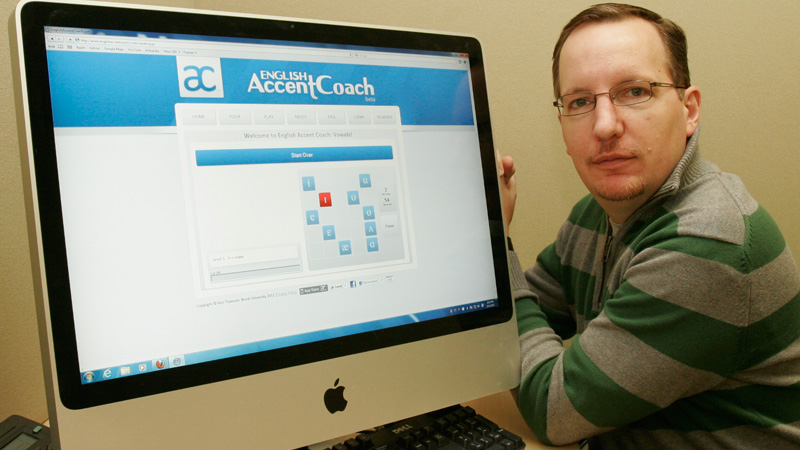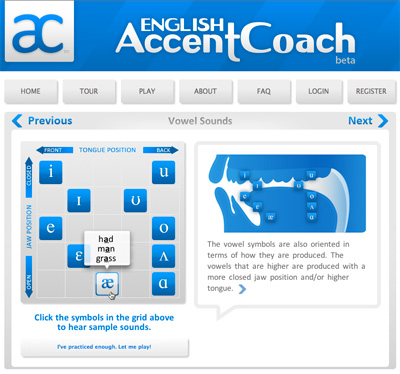 Ron Thomson has created a website and mobile app to help non-English speakers perfect their English accents.
Ron Thomson has created a website and mobile app to help non-English speakers perfect their English accents.
Ron Thomson has created a website and mobile app to help non-English speakers improve their English pronunciation.
A Brock linguistics researcher has developed a website and mobile app to help non-native English speakers fine-tune their English pronunciation.
Ron Thomson, associate professor of Applied Linguistics, recently launched English Accent Coach, a website with teaching and learning tools aimed at helping English learners improve the intelligibility of their speech.
The interactive game-like interface is based on his research into how pronunciation is best learned.
 “The focus of these tools is to help non-English speakers better hear differences between English sounds, so they’re equipped to monitor their own speech,” said Thomson. “This will help improve the intelligibility of their spoken English, which in turn, promotes more successful communication.”
“The focus of these tools is to help non-English speakers better hear differences between English sounds, so they’re equipped to monitor their own speech,” said Thomson. “This will help improve the intelligibility of their spoken English, which in turn, promotes more successful communication.”
“People who can process speech sounds more accurately also tend to be more fluent. They have better listening comprehension and vocabulary scores.”
The games on the English Accent Coach website for English vowels and consonants are free. There is also a mobile app game for vowels available for $1.99 through iTunes.
According to Thomson, users of English Accent Coach see results because it closely mimics the way a baby learns language. When you are learning a new language category, like vowels, you need many examples of the sound in order for it to sink in.
Research shows that if learners have only a few examples of a sound they are trying to learn, which is the case in traditional classrooms where English pronunciation is taught, sound recognition does not easily transfer to sounds produced by other speakers. This is because learners who hear and take in a single voice, for example, might end up learning the voice of the instructor, instead of what actually matters for identifying a language category. A few samples do not equal a category.
“Think of another linguistic concept like ‘chair’,” said Thomson. “Can someone seeing a dining chair automatically recognize that armchairs and desk chairs are also chairs while a barstool is not?”
“Research makes it clear that sound category learning is no different. A ton of experience is needed.”
Another problem with traditional teaching materials for non-native English speakers is that they tend to only be taught in the context of communication.
“With respect to language, the brain always focuses on meaning first, not on form,” said Thomson. “As soon as students start to get meaning, they may no longer pay attention to form.”
“Getting meaning doesn’t require perfectly hearing sounds, so learners may get to be just good enough, but no better. The website and iPhone app allow learners to focus on form, without distraction from meaning.”
For the app, Thomson hired students to come into his lab and record 3,000 words each, which were eventually chopped up and edited into more than 100,000 sound samples. The examples are roughly Canadian or General American English, which is also often referred to as the “language of media” because it is the standard accent for major network newscasts.
Thomson has been developing these tools for two years. Since their beta launch in late 2011, the website and mobile app have attracted more than 1,500 unique visitors from 74 countries.
English-language instructors at colleges and universities are also using the English Accent Coach tools, including Niagara College, Humber College, Grant MacEwan University (Edmonton) and NorQuest Community College (Edmonton).
Building on the success of these tools, a new English vowel recognition game is also in the works based on the popular electronic memory skills game Simon from the 80s.
Thomson received funding from Citizenship and Immigration Canada, which funds language training programs for newcomers to Canada, and the Social Sciences and Humanities Research Council of Canada.









Congratulations~! Professor Thomson,
Finally I come to see the final version of this web site. I will definitely use and promote this tool to every ESL(even EFL) learners who I will come to meet in the near future. I am going to use it myself more frequently as well.
Congratulations again!!
What is the website address??
Please make an android version.
Hi Ron – How very exciting! I’ll share this information with Spanish and Somali-speaking friends here in Edmonon who are working to improve their English language skills. My nephew – who is Korean and teaches English in Korea – will probably be excited to use this app with his students! I’ll ask him to contact you directly about it.
Blessings – Evelyn
Hi Andy,
The website address for the English Accent Coach is http://www.englishaccentcoach.com/
Thanks for the positive feedback, everyone.
Andy, an Android version will hopefully come – still working on improving the iOS offerings before targeting another platform.
Congratulations Professor Thomson,
I am teaching English language at a University in Lahore, Pakistan. Many students of mine are keen to learn good pronunciation, speaking and listening skills. I am going to recommend this website to them. Thanks for creating such a wonderful tool for them to practice.
Good Luck !!
Great work. For what it is, it is the best on the market. Will recommend it to my grad students and link to it on the blog!
Bill
Congratulations Ron! This looks amazing! I am doing an MA TESOL and my prof posted this article. I said “I know this guy!”
Blessings!
Very disappointed that Canadian government grants being used to create a vehicle that americanizes our language. There is NO North American media language, other than in sports where Canadian news commentators ape US words like DEE-fnce rather than the Canadian D’FENCE. Ironically, we still speak of the Dept of National d’FENCE, not DEE’fnc. Words like mobile, offence, letter “Z”, lieutenant, semi-, and thousands more have a distinct Canadian (or should I say international) pronunciation and often a different spelling. Very disappointed.
Hi Andy, Thanks for the comment. I think you must have misunderstood something. All of the speakers on the website are Canadian. If you go to the website and have a listen, you’ll find nothing untoward. Interestingly, Americans have accused me of trying to change their language! Can’t win 😉